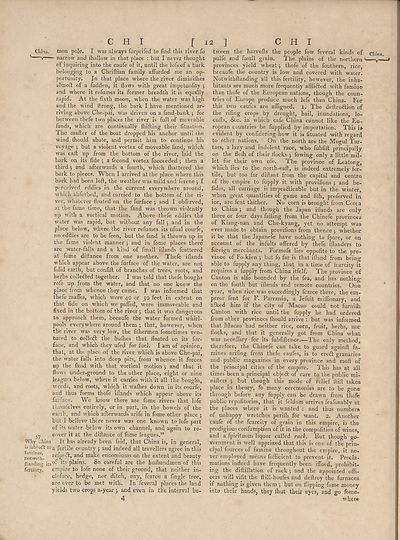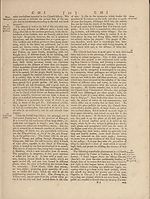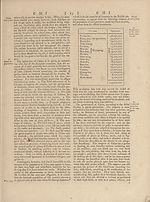Encyclopaedia Britannica, or, a Dictionary of arts, sciences, and miscellaneous literature : enlarged and improved. Illustrated with nearly six hundred engravings > Volume 6, CHI-Crystallization
(20) Page 12
Download files
Complete book:
Individual page:
Thumbnail gallery: Grid view | List view

CHI [
China, nion pole. I was always furprifed to find this river fo
' narrow and (hallow in that place : but I never thought
of inquiring into the caufe of it, until the lofs of a bark
belonging to a Chriftian family afforded me an op¬
portunity. In that place where the river diminifhes
almoft of a fudden, it flows with great impetuofity 5
and where it refumes its former breadth it is equally
rapid. At the fixth moon, when the water was high
and the wind Itrong, the bark I have mentioned ar¬
riving above Che-pai, was driven on a fand-bank 5 for
between thefe two places the river is full of moveable
fands, which are continually fhifting their fituation.
The mafter of the boat dropped his anchor until the
wind fhould abate, and permit him to continue his
voyage \ but a violent vortex of moveable fand, which
was caft up from the bottom of the river, laid the
bark on its fide j a fecond vortex fucceeded ; then a
third-, and afterwards a fourth, which fhattered the
bark to pieces. When I arrived at the place where this
bark had been loft, the weather was mild and ferene j I
perceived eddies in the current everywhere around,
which abforbed, and carried to the bottom of the ri¬
ver, whatever floated on the furface j and I obferved,
at the fame time, that the fand was thrown violently
up with a vortical motion. Above thefe eddies the
water was rapid, but without any fall; and in the
place below, where the river refumes its ufual courfe,
no eddies are to be feen, but the fand is thrown up in
the fame violent manner j and in- fome places there
are water-falls and a kind of fmall iflands fcattered
at fome diftance from one another. Thefe iflands
which appear above the furface of the water, are not
{olid earth, but confift of branches of trees, roots, and
herbs colle&ed together. I was told that thefe boughs
rofe up from the water, and that no one knew the
place from whence they came. I was informed that
thefe mafles, which were 40 or 50 feet in extent on
that fide on which we pafled, were immoveable and
fixed in the bottom of the river 5 that it was dangerous
to approach them, becaufe the water formed whirl¬
pools everywhere around them 5 that, however, when
the river was very low, the filhermen fometimes ven¬
tured to colled the bullies that floated on its fur¬
face, and which they ufed for fuel. I am of opinion,
that, at the place, of the river which is above Che-pai,
the water falls into deep pits, from whence it forces
up the fand with that vortical motion j and that it
flows under-ground to the other place, eight or nine
leagues below, where it carries with it all the boughs,
weeds, and roots, which it waflies down in its courfe,
and thus forms thofe iflands which appear above its
furface. We know there are fome rivers that lofe
themfelves entirely, or in part, in the bowels of the
earth, and which afterwards arife in fome other place :
but I believe there neves was one known to lofe part
of its water below its own channel, and again to re-
^ cover it at the diftance of fome leagues.”
Why China It has already been faid, that China is, in general,
islubjedl toa fertile country j and indeed all travellers agree in this
notwrh- refye&» and make encomiums on the extent and beauty
ftandin;] its°^ *ts plains. So careful are the hufhandmen of this
fertility! empire to lofe none of their ground, that neither in-
clofure, hedge, nor ditch, nay, fcarce a Angle tree,
are ever to be met with. In feveral places the land
yields two crops a-year 5 and even in the interval be-
4
2 ] CHI
tween the harvefts the people fow feveral kinds of
pulfe and fmall grain. The plains of the northern
provinces yield wheat j thofe of the fouthern, rice,
becaufe the country is low and covered with water.
Notwithftanding all this fertility, however, the inha¬
bitants are much more frequently afflidted with famine
than thofe of the European nations, though the coun¬
tries of Europe produce much lefs than China. For
this two caufes are afligned. 1. The deftrudlion of
the rifing crops by drought, hail, inundations, lo-
cufts, &c. in which cafe China cannot like the Eu¬
ropean countries be fupplied by importation. This i»
evident by confidering how it is fituated with regard
to other nations. On the north are the Mogul Tar¬
tars, a lazy and indolent race, who fubfift principally
on the flelh of their flocks j lowing only a little mil¬
let for their own ufe. The province of Leatong,
which lies to the north-eaft, is indeed extremely fer¬
tile, but too far diftant from the capital and centre
of the empire to fupply it with provifions ; and be-
fides, all carriage is impradlicable but in the winter,
when great quantities of game and fifti, preferved in
ice, are lent thither. No corn is brought from Corea
to China j and though the Japan iflands are only
three or four days failing from the Chinefe provinces
of Kiang-nan and Che-kyang, yet no attempt was
ever made to obtain provifions from thence j whether
it be that the Japanefe have nothing to fpare, or on
account of the infults offered by thefe iflanders to
foreign merchants. Formofa lies oppofite to the pro¬
vince ol Fo-kien ; but fo far is that ifland from being
able to fupply any thing, that in a time of icarcity it
requires a fupply from China itfelf. The province of
Canton is alfo bounded by the fea, and has nothing
on the ibuth but iflands and remote countries. One
year, when rice was exceedingly fearce there, the em¬
peror fent for F. Parranin, a Jefuit miffionary, and
alked him if the city of Macao could not furnifli
Canton with rice until the fupply he had ordered
from other provinces Ihould arrive : but was informed
that Macao had neither rice, corn, fruit, herbs, nor
flocks, and that it generally got from China what
was neceffary for its fubfiflence.—The only method,
therefore, the Chinefe can take to guard againfl; fa¬
mines arifing from thefe caufes, is to ertef granaries
and public magazines in every province and moft of
the principal cities of the empire. This has at all
times been a principal objetfl of care to the public mi-
nifters ; but though this mode of relief ftill takes
place in theory, fo many ceremonies are to be gone
through before any fupply can be drawn from thofe
public repofitories, that it feldom arrives feafonably at
the places where it is wanted : and thus numbers
of unhappy wretches perifti for want. 2. Another
caufe of the fcarcity of grain in this empire, is the
prodigious confumption of it in the compofition of wines,
and a fpirituous liquor called rack. But though go¬
vernment is well apprized that this is one of the prin¬
cipal fources of famine throughout the empire, it ne¬
ver employed means fufficient to prevent it. Procla¬
mations indeed have frequently been iffutd, prohibit¬
ing the diftillation of rack ; and the appointed offi¬
cers will vifit the ftill-houfes and deftroy the furnaces
if nothing is given them ; but on flipping fome money
into their hands? they fliut their eyes, and go fome-
tvherc
China, nion pole. I was always furprifed to find this river fo
' narrow and (hallow in that place : but I never thought
of inquiring into the caufe of it, until the lofs of a bark
belonging to a Chriftian family afforded me an op¬
portunity. In that place where the river diminifhes
almoft of a fudden, it flows with great impetuofity 5
and where it refumes its former breadth it is equally
rapid. At the fixth moon, when the water was high
and the wind Itrong, the bark I have mentioned ar¬
riving above Che-pai, was driven on a fand-bank 5 for
between thefe two places the river is full of moveable
fands, which are continually fhifting their fituation.
The mafter of the boat dropped his anchor until the
wind fhould abate, and permit him to continue his
voyage \ but a violent vortex of moveable fand, which
was caft up from the bottom of the river, laid the
bark on its fide j a fecond vortex fucceeded ; then a
third-, and afterwards a fourth, which fhattered the
bark to pieces. When I arrived at the place where this
bark had been loft, the weather was mild and ferene j I
perceived eddies in the current everywhere around,
which abforbed, and carried to the bottom of the ri¬
ver, whatever floated on the furface j and I obferved,
at the fame time, that the fand was thrown violently
up with a vortical motion. Above thefe eddies the
water was rapid, but without any fall; and in the
place below, where the river refumes its ufual courfe,
no eddies are to be feen, but the fand is thrown up in
the fame violent manner j and in- fome places there
are water-falls and a kind of fmall iflands fcattered
at fome diftance from one another. Thefe iflands
which appear above the furface of the water, are not
{olid earth, but confift of branches of trees, roots, and
herbs colle&ed together. I was told that thefe boughs
rofe up from the water, and that no one knew the
place from whence they came. I was informed that
thefe mafles, which were 40 or 50 feet in extent on
that fide on which we pafled, were immoveable and
fixed in the bottom of the river 5 that it was dangerous
to approach them, becaufe the water formed whirl¬
pools everywhere around them 5 that, however, when
the river was very low, the filhermen fometimes ven¬
tured to colled the bullies that floated on its fur¬
face, and which they ufed for fuel. I am of opinion,
that, at the place, of the river which is above Che-pai,
the water falls into deep pits, from whence it forces
up the fand with that vortical motion j and that it
flows under-ground to the other place, eight or nine
leagues below, where it carries with it all the boughs,
weeds, and roots, which it waflies down in its courfe,
and thus forms thofe iflands which appear above its
furface. We know there are fome rivers that lofe
themfelves entirely, or in part, in the bowels of the
earth, and which afterwards arife in fome other place :
but I believe there neves was one known to lofe part
of its water below its own channel, and again to re-
^ cover it at the diftance of fome leagues.”
Why China It has already been faid, that China is, in general,
islubjedl toa fertile country j and indeed all travellers agree in this
notwrh- refye&» and make encomiums on the extent and beauty
ftandin;] its°^ *ts plains. So careful are the hufhandmen of this
fertility! empire to lofe none of their ground, that neither in-
clofure, hedge, nor ditch, nay, fcarce a Angle tree,
are ever to be met with. In feveral places the land
yields two crops a-year 5 and even in the interval be-
4
2 ] CHI
tween the harvefts the people fow feveral kinds of
pulfe and fmall grain. The plains of the northern
provinces yield wheat j thofe of the fouthern, rice,
becaufe the country is low and covered with water.
Notwithftanding all this fertility, however, the inha¬
bitants are much more frequently afflidted with famine
than thofe of the European nations, though the coun¬
tries of Europe produce much lefs than China. For
this two caufes are afligned. 1. The deftrudlion of
the rifing crops by drought, hail, inundations, lo-
cufts, &c. in which cafe China cannot like the Eu¬
ropean countries be fupplied by importation. This i»
evident by confidering how it is fituated with regard
to other nations. On the north are the Mogul Tar¬
tars, a lazy and indolent race, who fubfift principally
on the flelh of their flocks j lowing only a little mil¬
let for their own ufe. The province of Leatong,
which lies to the north-eaft, is indeed extremely fer¬
tile, but too far diftant from the capital and centre
of the empire to fupply it with provifions ; and be-
fides, all carriage is impradlicable but in the winter,
when great quantities of game and fifti, preferved in
ice, are lent thither. No corn is brought from Corea
to China j and though the Japan iflands are only
three or four days failing from the Chinefe provinces
of Kiang-nan and Che-kyang, yet no attempt was
ever made to obtain provifions from thence j whether
it be that the Japanefe have nothing to fpare, or on
account of the infults offered by thefe iflanders to
foreign merchants. Formofa lies oppofite to the pro¬
vince ol Fo-kien ; but fo far is that ifland from being
able to fupply any thing, that in a time of icarcity it
requires a fupply from China itfelf. The province of
Canton is alfo bounded by the fea, and has nothing
on the ibuth but iflands and remote countries. One
year, when rice was exceedingly fearce there, the em¬
peror fent for F. Parranin, a Jefuit miffionary, and
alked him if the city of Macao could not furnifli
Canton with rice until the fupply he had ordered
from other provinces Ihould arrive : but was informed
that Macao had neither rice, corn, fruit, herbs, nor
flocks, and that it generally got from China what
was neceffary for its fubfiflence.—The only method,
therefore, the Chinefe can take to guard againfl; fa¬
mines arifing from thefe caufes, is to ertef granaries
and public magazines in every province and moft of
the principal cities of the empire. This has at all
times been a principal objetfl of care to the public mi-
nifters ; but though this mode of relief ftill takes
place in theory, fo many ceremonies are to be gone
through before any fupply can be drawn from thofe
public repofitories, that it feldom arrives feafonably at
the places where it is wanted : and thus numbers
of unhappy wretches perifti for want. 2. Another
caufe of the fcarcity of grain in this empire, is the
prodigious confumption of it in the compofition of wines,
and a fpirituous liquor called rack. But though go¬
vernment is well apprized that this is one of the prin¬
cipal fources of famine throughout the empire, it ne¬
ver employed means fufficient to prevent it. Procla¬
mations indeed have frequently been iffutd, prohibit¬
ing the diftillation of rack ; and the appointed offi¬
cers will vifit the ftill-houfes and deftroy the furnaces
if nothing is given them ; but on flipping fome money
into their hands? they fliut their eyes, and go fome-
tvherc
Set display mode to:
![]() Universal Viewer |
Universal Viewer | ![]() Mirador |
Large image | Transcription
Mirador |
Large image | Transcription
Images and transcriptions on this page, including medium image downloads, may be used under the Creative Commons Attribution 4.0 International Licence unless otherwise stated. ![]()
| Permanent URL | https://digital.nls.uk/193007683 |
|---|
| Attribution and copyright: |
|
|---|
| Description | Ten editions of 'Encyclopaedia Britannica', issued from 1768-1903, in 231 volumes. Originally issued in 100 weekly parts (3 volumes) between 1768 and 1771 by publishers: Colin Macfarquhar and Andrew Bell (Edinburgh); editor: William Smellie: engraver: Andrew Bell. Expanded editions in the 19th century featured more volumes and contributions from leading experts in their fields. Managed and published in Edinburgh up to the 9th edition (25 volumes, from 1875-1889); the 10th edition (1902-1903) re-issued the 9th edition, with 11 supplementary volumes. |
|---|---|
| Additional NLS resources: |
|

